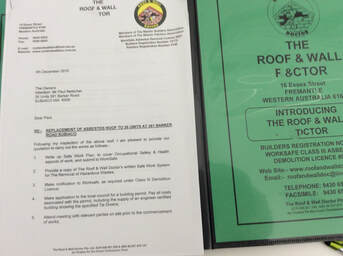Construction bid clarification and negotiation meetings. Tips for winning your next project.25/7/2015 Before awarding a new construction project many clients request the contractor with the lowest price, or the lowest bidder, or maybe even the contractors with the 3 lowest project price or quotation, to attend a price or bid clarification meeting. If you are invited to a post bid (project price submission) meeting your actions in the meeting could mean the difference between winning and losing the construction project. Rash actions or concessions at the meeting could also cost the company dearly should you be awarded the project. #pricingconstructionprojects #constructionprojectpricing #contractors The purpose of post construction project price meetingsThe purpose of these meetings is often to: 1. Meet and assess the contractor’s team 2. Ensure the contractor has understood the project and has the necessary resources 3. Address any concerns regarding the contractor’s bid submission 4. Discuss changes in the scope of works that have occurred subsequent to the bid submission 5. Negotiate better prices or contract term "Be prepared for the project negotiation meeting" How contractors can prepare for project price negotiationsPreparing for the meeting Before the meeting the client will usually send out an agenda. If they haven't it might be prudent to request one so you can be better prepared for the meeting. In preparation for the meeting: 1. read through the agenda and ensure you’re prepared 2. go through the tender again to refresh yourself on the details (often you have moved onto other projects and have forgotten some of the details) 3. ensure that everyone attending the meeting is familiar with the project and can add value to the discussion (often senior managers or executives from the contractor attend, many of whom are unfamiliar with the tender and the project constraints, leading them to make inappropriate comments, promises and commitments – ensure they are fully briefed and understand the risks and constraints of the project) 4. ensure you know the date, time and place of the meeting, as well as the contact person and their details (it’s also useful to know the name of the meeting room since I’ve regularly arrived for a meeting at a large organisation and the receptionist has been unable to find the contact person because they are busy meeting with another contractor) 5. take a complete copy of the tender submission, filed correctly, including the calculations and the post-tender correspondence (there’s nothing worse than being asked a question in the meeting and having to page through file after file, looking for the relevant document) 6. take sufficient business cards, a note pad and pen The contractor's negotiating teamYour team The size and the make-up of the contractor’s team attending the meeting will depend on a number of factors: 1. the size of the project 2. the agenda provided by the client (for example, if there’s an item on quality it may be prudent for the proposed project Quality Advisor to attend, or, even perhaps the company’s Quality Manager) 3. who the client’s attendees are 4. what the client’s known priorities are (for instance, if safety is important take the company’s Safety Manager as well as the proposed project Safety Advisor) It’s useful to include the senior staff you propose to use on the project. Where possible include the person who prepared the bid and is familiar with the submission and calculations. Of course it goes without saying that everyone should be dressed neatly and arrive for the meeting on time. It’s often useful to arrive early as it may well provide an opportunity to see the other contractors being interviewed, or to meet some of the client’s team informally before the meeting which could provide some insight into their thoughts regarding the project and your tender submission. Case study: We arrived for a construction project clarification meeting to be told apologetically that we wouldn’t be starting on time as the previous contractor had arrived late for their meeting – not a good start for them! However, five minutes later the other contractor walked out of the meeting looking embarrassed and we were called in for our meeting almost on schedule. Sometime later when I met the other contractor at an industry event I asked why their meeting was so short and they told me they thought the meeting was for another project they had submitted a price for to the same client. They arrived with the pricing documentation for that construction price and were prepared to discuss that project, so when the client started asking questions their replies related to the wrong project. When the client couldn’t understand what they were referring to they eventually figured out the confusion. Obviously the client was less than amused and quickly terminated the meeting. Needless to say they weren’t awarded either of the projects. The project negotiation meeting"appear positive, and if what the client is asking isn’t possible explain why and offer alternative solutions" The meeting At the meeting: 1. introduce the team, explaining each person’s role on the project 2. ensure your team is led by one person who may delegate others in the team to answer particular questions 3. take notes at the meeting even if the client confirms they’ll be sending out formal minutes 4. take time to answer the client’s questions; if uncertain ask them if it’s possible to provide an answer later 5. listen carefully to the client’s concerns and try and address these during the meeting as well as in post-meeting correspondence 6. at the end of the meeting summarise the questions that require answers, by when they will be answered, and to whom the answer should be directed (ensure there’s sufficient time to get the answers to the client) 7. appear positive, and if what the client is asking isn’t possible explain why and offer alternative solutions 8. don’t make promises and commitments that cannot be kept 9. thank the client for inviting you to the meeting After project price clarrification meetingsAfter the meeting After the meeting on returning to the office: 1. allocate the questions to the relevant staff and then coordinate the answers into one reply to the client 2. when the minutes of the project price negotiation meeting are received check that they are correct and are a fair reflection of what was discussed and agreed at the meeting (if there is anything that you disagree with, address this in a formal letter to the client) 3. if necessary send a letter after the meeting confirming the discussions and any revisions to the tender offer made during the meeting 4. ensure the client’s questions are replied to within the agreed time 5. send a letter thanking the client for the opportunity to meet with them and offer to answer any further questions they may have "sell your company and price to the client" Winning your next construction projectThese meeting provide your company an opportunity to sell to the client why they are the best contractor to construct their project. Don’t spoil this opportunity by being unprepared or by taking the wrong people to the meeting. #winningconstructionprojects #pricingconstructionprojects #construction Next week I will discuss the negotiations further in: ‘A word of warning – don’t secure the project at any cost’ Construction project bid negotiations – Don’t make a mistake Similar articles by the author Post bid communications – the difference between winning and losing a bid How to improve cash flow on your project - part 2 How do construction companies keep a good client (Written by Paul Netscher the author of the acclaimed books ‘Successful Construction Project Management: The Practical Guide’ and ‘Building a Successful Construction Company: The Practical Guide’. Both books are available in paperback and e-book from Amazon and other retail outlets. This article is adapted from information included in these books.) © 2022 This article is not to be reproduced for commercial purposes without written permission from the author.
construction management construction project management
9 Comments
Paul
18/8/2015 02:50:19 am
I am pleased you found this article useful. Good luck with winning your next project. Regards, Paul
Reply
KT
1/12/2015 04:41:48 pm
Could you explain the different between bid clarification meeting and the negotiation meeting? Or they are the same? Thanks.
Reply
Paul
3/12/2015 01:54:01 pm
Hello KT, I have used both bid clarification meeting and negotiation meeting to mean meetings between the client and the contractor after the contractor has submitted their tender or quotation. These meetings have different names in different part of the world. The intent is usually to clarify points in the quotation or tender, ensure the contractor understands the project and has the resources and expertise to construct it, and often to negotiate with the contractor either to lower the price of certain items, reduce the construction duration, or to remove conditions from the contractor's quotation.
Reply
M. Z. Ansari
24/4/2017 06:22:30 pm
Really very useful article. Thank Mr. Paul.
Reply
Paul
25/4/2017 11:26:12 am
Thanks for taking the time to respond to my article.
Reply
Leave a Reply. |
Archives
June 2024
Note: We welcome genuine comments, especially comments that add additional information to the subject matter in the article. We however reserve the right to remove inappropriate comments, which includes comments that have nothing to do with the subject, comments that include inappropriate language, and comments that are an advertisement for a product or company, or which include an advertising link. Comments must be in English. We will not enter into discussion on why a particular comment was removed.
CategoriesCopyright 2016 - The attached articles cannot be reproduced for commercial purposes without the consent of the author.
The opinions expressed in the attached articles are those of the writer. It should be noted that projects are varied and different laws and restrictions apply which depend on the location of the contractor and the project. It's important that the reader uses the supplied information taking cognisance of their particular circumstances. The writer assumes no responsibility or liability for any loss of any kind arising from the reader using the information or advice contained herein. "I have what I consider some of the best books on construction management."
Books are available from: Amazon.com Amazon.co.uk takealot.com kalahari.com Amazon.in Amazon.de Amazon.fr Amazon.it Amazon.com.au Powell's Fishpond uread bokus Amazon.ca Amazon.es Other retail stores Available in paperback or on Kindle "28 YEARS OF CONSTRUCTION PROJECT MANAGEMENT EXPERIENCE, DEVELOPING SUCCESSFUL CONSTRUCTION PROJECT MANAGERS AND BUILDING SUCCESSFUL CONSTRUCTION COMPANIES"
|







 RSS Feed
RSS Feed




